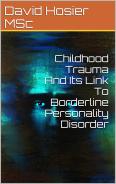Tags
Childhood Trauma : Reactions to Trauma According to Age
Trauma affects children in different ways depending upon the age group they fall into. In this article, I will look at how 3 different age groups may be affected ;These are :
– very young children (0-3 years)
– young children (4-11 years)
– adolescents
VERY YOUNG CHILDREN : it is a myth that just because very young children cannot verbalize the effect that trauma has on them, and often can’t understand the trauma, they are unaffected by it. On the contrary, this age group is extremely vulnerable and the effects of trauma on them can be very serious indeed.
Due to the fact that this age group is unable to explain the distress they feel in words, they may, instead, ‘act out’ their distress through their behaviour. I provide some examples below :
– fear of separation from the care-giver
– excessive displays of temper
– sadness
– anxiety/fearfulness
– irritability
– easily startled
– aggressive behaviour
– excessive crying
– excessive screaming
– very demanding of attention through both positive and negative behaviours
– development of new fears
VULNERABILITY OF THE YOUNG, DEVELOPING BRAIN :
The brains of children in this age group are developing very rapidly and, as such, their brain development is extremely vulnerable to being adversely affected.
Research shows that severe trauma at this stage of life can damage the development of the area of the brain known as the cortex. Damage done to the development of this part of the brain can lead to :
– inability to properly regulate (control) their emotions
– delays in language development
– impaired I.Q.
– problems relating to perception and awareness
– memory problems
– attentional difficulties
Finally, it should be pointed out that at this age children our utterly dependent on the emotional support of their primary care-giver. If this is not forthcoming the effects of trauma can be particularly severe.
YOUNG CHILDREN : The effect of trauma on children in this age group may result in :
– ‘traumatic play’ – this type of play tends to be repetitive and relates to the trauma, either directly or symbolically
– difficulty articulating the effect that the trauma has had upon them
– ‘developmental regression’ – this means reverting back to an earlier stage of development eg distress at having to be separated from parents in situations where this distress was not displayed prior to the trauma
– frequently feeling fearful in a variety of situations (not just those situations which relate to the original trauma)
– problems with sleep, which may include having nightmares and experiencing ‘night terrors’
– loss of speech
– bed-wetting
– constant concern for own safety and the safety of family members
– a compulsion to constantly re-tell the details of the traumatic experience
– difficulties concentrating at school
– inappropriate guilt and shame relating to the trauma
– reckless behaviour
– aggressive behaviour
– psychosomatic symptoms (ie symptoms brought on by stress with no obvious physical cause) eg headaches and stomach aches
ADOLESCENTS : The physical development of the brain is not complete until the mid-twenties. The adolescent brain and nervous system is, therefore, is especially vulnerable to the adverse effects of trauma. Damage to such development, in particular, has been linked to difficulties in regulating (controlling) emotions and difficulties forming and maintaining inter-personal relationships.
Adolescence, too, is a time of significant emotional growth, and, therefore, traumatic experiences at this crucial stage of life can have profound and very-long lasting effect upon the individuals view of the world, of others and of him/herself.
Other specific problems the adolescent may develop as a result of trauma include :
– reliance on alcohol/drugs to escape from mental anguish (this is also called ‘dissociation’ ; click here to read my article on dissociation).
– promiscuous sex (this can be another form of dissociation)
– ‘acting out’ feelings of distress (eg aggression, violence, anger) -click here to read my article relating to this
– self-destructive behaviour
– depression/anxiety
– withdrawal from family/friends
– repetitive fantasies of revenge
– post-traumatic stress disorder (PTSD) – click here to read my article on this
– depression (click here to read my article on the link between childhood trauma and major depression)
– inappropriate guilt and shame (click here to read my article relating to this)
– feeling like a ‘bad’ person (click here to read my article on why this happens)
Above eBooks now available for immediate download on Amazon. $4.99. CLICK HERE (other titles also available).
David Hosier BSc Hons; MSc; PGDE(FAHE).








